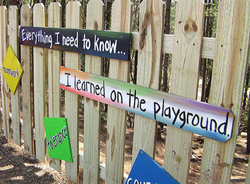
The Lousy Speaker
This is one of those tips the music stores don’t want you to think about. :>)
Yes, it’s important to have good, accurate studio monitors and/or headphones. However, I’ve found (especially this past year) that my crappy little 3-inch loudspeakers are insanely helpful mixing tools.
People always ask me, “What crappy speakers do you recommend?”
That’s a hilarious question. Just use something crappy. Something with a small speaker on it. I’ve got some old Roland speakers with a 3-inch woofer. They’re not full range, and they’re not good for making really detailed decisions.
However, they INSTANTLY show me major flaws in my mix. Like if the vocal is too loud, or if the bass it too muddy. Or maybe the guitars are too aggressive or the snare drum disappears.
As an added bonus, I only use one of these speakers, and I send a mono signal to it. So now it’s my crap speaker AND my mono speaker.
I’ve found that if I can get the mix to sound killer on this speaker, it will sound killer in my car, and it will still sound great on my nice monitors, too.
It’s not always fun to hear your mix on a crap speaker, but it can be insanely useful.
Dare to Compare
Comparisons can be painful.
You might think your mix is amazing, but then you hear it next to a professional mix, and you’re instantly sad. The pro mix sounds so much better than yours.
Yes, it hurts (and yes, I’ve been there many a time). But it’s good for you to take these long honest “looks” at your mixes. If your mix doesn’t stand up to a professional mix, then you probably have some more work to do.
It’s difficult and frustrating, but it makes you better.
Compare your mixes to professional ones, and slowly but surely your mixes will start sounding more and more professional.
The Mix is Slave to the Recording
This is probably the most important thing you could learn. (And it’s been something I’ve run into over and over again this year.)
Your mix is slave to the recording. If the recording sounds horrible, your mix will sound horrible.
It’s so easy to have the “I’ll just fix it in the mix” mentality, but you simply CAN’T do it. You can enhance a recording. You can even make it sound better. But your mixes won’t be amazing if you’re not putting as much focus and effort on the recording side as you do the mixing side.
You must…you simply MUST…put in huge amounts of effort to capture great-sounding performances. This means rescheduling a session for another day if the performer isn’t “feeling it.” It means re-recording tracks that simply don’t sound good. It means spending lots of time working out the arrangement before you lay down a bunch of tracks. It means taking the time to audition a few mic placements before you start recording.
The better your recordings sound, the better your mixes will sound. Period.
Joe Gilder is a Nashville-based engineer, musician, and producer who also provides training and advice at the Home Studio Corner.
